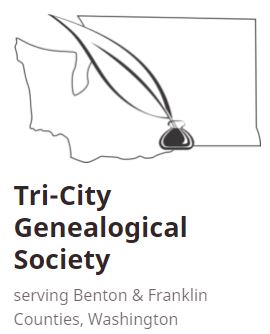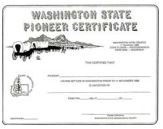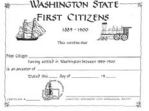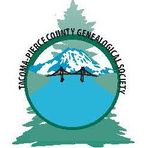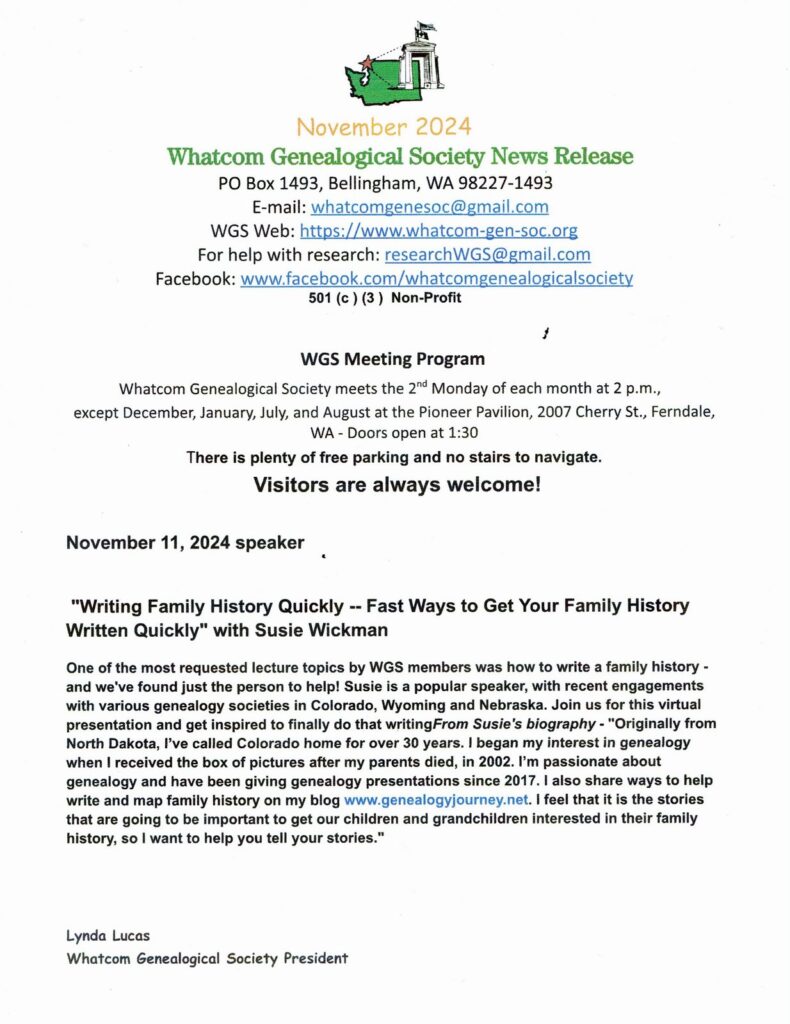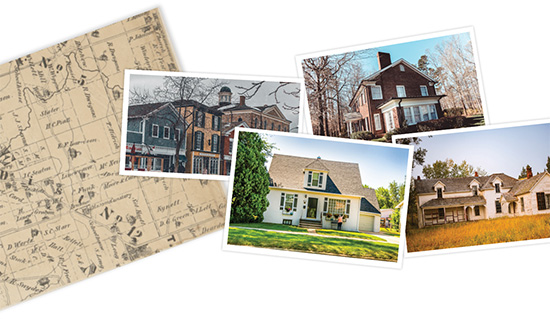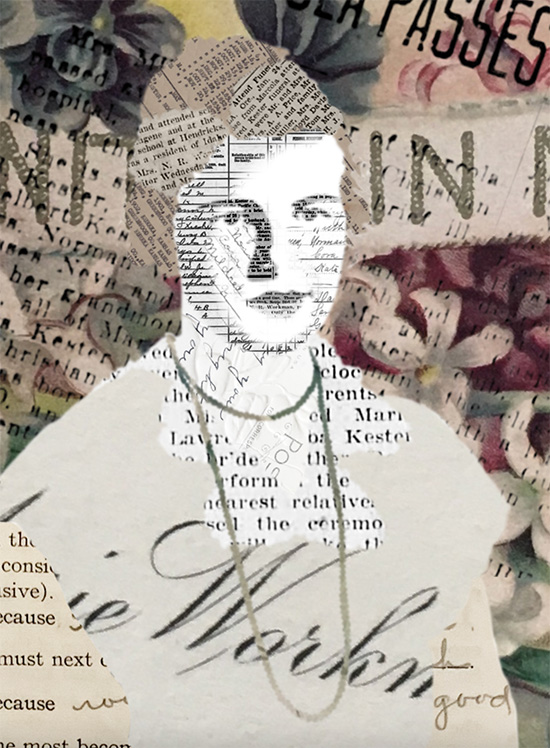image courtesy Sheyna Watkins
Once living memory of a person fades, paper records are often all that remains of their life. SGS eNews editor Sheyna Watkins made this image of her great grandmother that she never knew using the documents about her. Although a photograph of her was used as a reference, this image includes no photograph.
Watkins used Adobe Photoshop to make this montage, but this same project can also be done by cutting and gluing photocopied and printed out records. Try it yourself, or adapt it as an activity for kids. Start by outlining the clothing, hair, head and eyes … (trace from a photo if you need to). Next, cutout the parts from the drawing and use them as a pattern to cutout parts of the documents to make your montage. Glue the pieces on a separate piece of paper to make the finished portrait. SAVE THE DATE Fiske Genealogical Library Classes
Wednesdays, 10:00 a.m.-11:15 a.m.
• Nov. 6 — “Missing: Reward! Locating Widows, Spinsters, and Bachelors” with Sara Cochran
• Nov. 13 — “Finding Treasures in NewspaperArchive” with Mary Kircher Roddy
• Nov. 20 — “MyMaps: Create a Map of Your Family’s Migration West” with Janet O’Conor Camarata
For more information see the Fiske Library website. Ten Steps to Writing and Publishing Your Family History
American Ancestor of New England Historic Genealogical Society
Thursday, Nov. 14, 12:00 p.m.-1:00 p.m.
Writing and publishing your genealogy is a fantastic way to preserve your family history for future generations and to share it with others. Join American Ancestors Vice President of Publishing, Sharon Inglis, as she discusses her top tips for writing and publishing your family history.
Family Tree Maker SIG
Eastside Genealogical Society
Nov. 15, 2024, 10:30 p.m.-12:30 p.m.
Join Eastside Genealogical Society and SGS to learn and share tips and tricks for using Family Tree Maker by Software MacKiev. The meetings open about 15 minutes in advance. You can join and/or leave whenever you have to, and you may email your question(s) in advance or bring them up during the meeting.
2024 GFO Virtual Fall Seminar
Genealogical Forum of Oregon
Eastside Genealogical Society
Friday, Nov. 1 through Saturday, Nov. 2, 2024
GFO has announced there 2024 Fall Seminar. It will feature a feast of DNA topics. Genetic Genealogist Paul Woodbury will discuss using DNA to solve genealogical questions. Friday evening will be a beginner session, with Saturday devoted to intermediate and advanced techniques. For more information visit the GFO’s website.
SGS CALENDAR OF EVENTS Good Shepherd Center, Suite 302
4649 Sunnyside Ave N
Seattle, WA 98103
206 522-8658Hours : Tuesday, Wednesday, Thursday, Friday, and Saturday
** 10:00 a.m .- 3:00 p.m. ** Always check the SGS Website Calendar of Events for the meeting links, registration, or for last minute updates or changes to the schedule. Be advised you may need to register in advance to join a meeting. All times listed are Pacific Time unless otherwise noted Saturday, Nov. 2, 2024, 10:15 a.m.- 12:15 p.m., FamilySearch SIG, Discover the many ways to use the FamilySearch website in your research. Meeting includes instruction and time for Q&A. Email Lou to get on the email list: loudaly@nwlink.com Sunday, Nov. 3, 2023, 1:00 pm-3:00 pm, DNA Workshop, with Cary Bright and Craig Gowens. To participate you need to be on the SGS DNA Interest Group email list. Contact Cary Bright at sgsdnasig@seagensoc.org to join.
Monday, Nov. 4, 2024, 10:00 a.m.-11:30 a.m., Brags & Bricks Social Interest Group (Virtual), Join us for an informal social gathering. Share your recent genealogical successes and challenges, or just come to hang out with other genealogists. Remember the new Zoom link started this month.
Wednesday, Nov. 6, 2024, 6:30 p.m.-7:30 p.m., Pacific Northwest Interest Group (Virtual), Share information and discuss Pacific Northwest genealogical research. Register on the SGS website.Thursday, Nov. 7, 2024, 11:00 a.m., SGS Tour of NW African American Museum (Field Trips), we invite you to join us there on a guided tour to learn more about Black heritage, including how African Americans got to the Pacific Northwest. Register here by Nov. 4.
Saturday, Nov. 9, 2024, 1:00 a.m.-2:30 p.m., Second Saturday, “Walls That Talk: How to Research the History of Your House,” Presented by Midori Ozaki. From historical records to architectural clues, this session will provide insight into how you can trace the history of a building, whether it’s a family home or local landmark with an intriguing past. Register here.
Monday, Nov. 11, 2024, 10:00 a.m.-11:30 a.m., Brags & Bricks Social Interest Group (Virtual), Join us for an informal social gathering. Share your recent genealogical successes and challenges, or just come to hang out with other genealogists. Remember the new Zoom link started this month.Monday, Nov. 11, 2024, 1:00 p.m.-3:00 p.m., SGS Board of Directors Meeting (Virtual), All SGS members are welcome to attend. SGS is an all volunteer organization. Please be involved. Members must sign in to website to see Zoom link.
Monday, Nov. 11, 2024, 6:00 p.m.-7:30 p.m., Write It Up! SIG (Virtual), Join this group to share and discuss writing projects, resources, and ideas. To join or learn more, contact SGS Director of Education (education@seagensoc.org).
Tuesday, Nov. 12, 2024, 10:00 a.m.-11:00 a.m., Tech Tuesday (Virtual), informal consultation time on DNA, genealogy software, or genealogy-related technical issues. All are welcome. No appointment necessary. Bring us your problem; we’ll try to help.
Wednesday, Nov 13 2024, 7:00 p.m.-9:00 p.m., MAC Computer SIG, Jointly sponsored by SGS and Fiske. Meetings address topics and resources for Macintosh (Apple) computers and the Reunion genealogy software program. A link to login will be sent to the MAC SIG email list. If you would like to join, send an email to macusersig@seagensoc.org to be added to the email list.
Saturday, Nov. 16, 2024, 10:00 a.m.-noon, Irish SIG (Virtual), with Susan McKee. Share information and discuss Irish ancestral research. View SGS calendar for details on joining this group.
Saturday, Nov. 16, 2024, 1:00 p.m.-3:00 p.m, German SIG (Virtual), Share what you know OR get help with problems in your own research. Topic this month: German Emigration Records. Register on the SGS website.
Monday, Nov. 18, 2024, 10:00 a.m.-11:30 a.m., Brags & Bricks Social Interest Group (Virtual), Join us for an informal social gathering. Share your recent genealogical successes and challenges, or just come to hang out with other genealogists. Remember the new Zoom link started this month.Tuesday, Nov. 19, 2024, 1:00 p.m.-3:00 p.m., “Pass It On” Writers’ Group, Create your family history and share with others in an effort to improve your writing. Please note: The Writers’ Group is at the maximum number of participants and is not currently accepting any new members.
Monday, Nov. 25, 2024, 10:00 a.m.-11:30 a.m., Brags & Bricks Social Interest Group (Virtual), Join us for an informal social gathering. Share your recent genealogical successes and challenges, or just come to hang out with other genealogists. Remember the new Zoom link started this month.Tuesday, Nov. 26, 2024, 10:00 a.m.-11:00 a.m., Tech Tuesday (Virtual), informal consultation time on DNA, genealogy software, or genealogy-related technical issues. All are welcome. No appointment necessary. Bring us your problem; we’ll try to help.
Sunday, Dec. 1, 2024, 1:00 pm-3:00 pm, DNA Workshop, with Cary Bright and Craig Gowens. To participate you need to be on the SGS DNA Interest Group email list. Contact Cary Bright at sgsdnasig@seagensoc.org to join.
Monday, Dec. 2, 2024, 10:00 a.m.-11:30 a.m., Brags & Bricks Social Interest Group (Virtual), Join us for an informal social gathering. Share your recent genealogical successes and challenges, or just come to hang out with other genealogists. Remember the new Zoom link started this month.Wednesday, Dec. 4, 2024, 6:30 p.m.-7:30 p.m., Pacific Northwest Interest Group (Virtual), Share information and discuss Pacific Northwest genealogical research. Register on the SGS website.Saturday, Dec. 7, 2024, 10:15 a.m.- 12:15 p.m., FamilySearch SIG, Discover the many ways to use the FamilySearch website in your research. Meeting includes instruction and time for Q&A. Email Lou to get on the email list: loudaly@nwlink.com.
Join SGS Today* to renew your membership: log in on the Members Home page
and click the green renew membership button. November 1, 2024
SGS eNews! comes out the first of every month. contact eNews!
forward this email to a friend |



